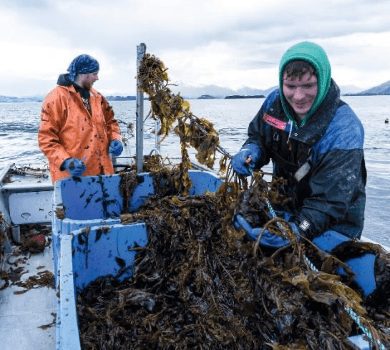Growing interest in farming seaweed commercially as part of the state’s developing ocean economy has prompted a second round of training opportunity for those interested in starting their own seafood farm in Alaska.
Alaska Fisheries Development Foundation and partners are accepting applications through Feb. 1 on the Alaska Sea Grant website, alaskaseagrant.org, seeking a new cohort of participants for virtual format training for over 100 people in 2021. The goal of the program is to provide tools and training necessary for Alaskans to own and operate their own seafood farm. The program is targeted towards commercial fishermen, Alaska Natives and fishing communities, AFDF officials said.
It will include an online webinar on Feb. 2, a series of virtual technical multi-day workshops over one week beginning on Feb. 22, one-on-one mentoring for high-performance participants, and potential in-person hands-on field training in the spring and summer of 2021, depending on the status of the global novel coronavirus pandemic.
This past year AFDF conducted the program in Kodiak, Ketchikan and Sitka as part of Phase 2 of the Alaska Mariculture Initiative, but due to the pandemic virtual training has been introduced, for health and safety reasons. The virtual formal will allow expansion of the program from 48 participants in 2020 to over 100 in the coming year.

Registration for the 2021 program will be in two parts. First all interested Alaska residents are invited to register for the Feb. 2 webinar. Registration begins on Feb. 3 for the in- depth series of virtual technical multi-day workshops, two to three hours each, for the week beginning on Feb. 22. While there is no expected cap on webinar participants, the number of participants in the technical workshops will be capped at 150 people.
Materials, final workshop dates and further information is to be distributed prior to the start of those workshops.
The range of topics to be covering during the workshops will include identification of seaweed species, lifecycles of seaweed, the hatchery process, site evaluation, use of the Mariculture Map, farm gear and equipment design, business plan development, farm financing, state lease application process, gear deployment, seeding and harvesting techniques, quality handling, and safety considerations. Instruction is to be provided by AFDF, GreenWave, Alaska Sea Grant, the Alaska Departments of Natural Resources and Fish and Game, Blue Evolution, OceansAlaska, Alaska Longline Fishermen’s Association, the Alaska Marine Safety Education Association, seaweed farmers and others.














